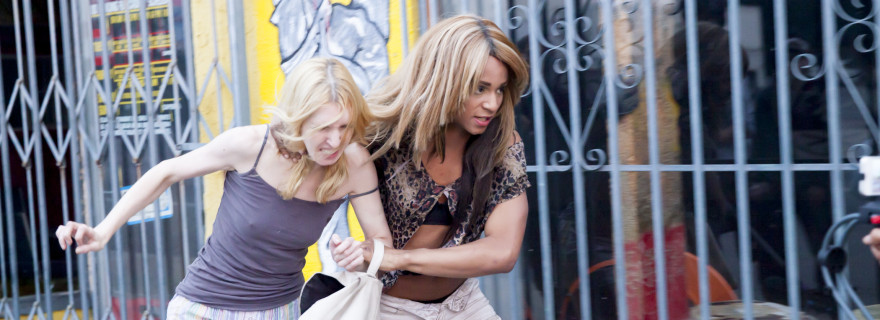'Tangerine'
Movie Rating:
3
‘Tangerine’ drew attention at Sundance and elsewhere on the film festival circuit for being a feature film shot entirely on an iPhone. That’s the kind of canny gimmick that’ll get an indie some attention that it may or may not deserve. Thankfully, in this case, the movie has more than a gimmick in play. It’s not a masterpiece, but it’s a damn interesting little movie that actually benefits from the cell phone aesthetic.
Set on the depressingly sun-soaked streets of Los Angeles at Christmastime, Kitana Kiki Rodriguez stars as a transgender prostitute named Sin-Dee who was just released from a stint in prison. She meets up with her best friend Alexandra (Mya Taylor) and learns that her pimp/boyfriend has been cheating on her. Given that the other woman is both white and female from birth, Sin-Dee quickly spirals into a rage and races off to track down the culprit. While she’s off causing trouble, Alexandra endures another day’s grind on the street, and the cameras also start to follow one of her johns. Karren Karagulian plays a streetwalker-obsessed cab driver who dives into a life with sex workers to flee from the stress of his family during the holiday season. Eventually, all these tangled lives come together. As you might imagine, the story doesn’t exactly wrap up with a group hug.
Though the particularly lo-fi aesthetic of ‘Tangerine’ suggests that the project sprung from first-time filmmakers, the movie was actually the work of writer/director Sean Baker, who has been kicking around for a while on various productions including ‘Greg the Bunny’ and its spin-off ‘Warren the Ape’. Baker likely could have gotten a more traditional production model, but the grimy cell phone cinematography works. After all, he’s peering into the lives of characters who typically never get a voice in film. Creating something that looks cinematic, yet also looks like it might have been captured accidentally by bystanders suits the material rather nicely. While it’s clear that the movie isn’t exactly blockbuster-budgeted, you’d never guess it was shot entirely on phones unless that was a part of the marketing.
Of course, style only gets a movie like this so far. The real test is what actually happens in front of those phones. Thankfully, Baker and compnay delivered some interesting work there as well.
‘Tangerine’ has a slight air of John Waters to it, in the best possible sense. First of all, it’s quite a funny little flick never afraid to revel in its own outrageousness. In particular, a car wash sex session and a sequence in a motel room brothel need to be seen in slackjawed disbelief. More importantly, Baker clearly loves these characters. They’re all incredibly endearing. Central to it all is the relationship between Sin-Dee and Alexandra, which is tender and joyful without ever feeling coy. They love each other, but show it in oddball ways, like how Sin-Dee stops tossing around the woman who slept with her man long enough to force her to watch Alexandra sing on stage. They even form a warm bond over the course of their feature length antagonism. Granted, that bond comes over a shared crack pipe, but there’s still a moment of recognition between two very different people who are lost in the same ways. These characters all manage to overcome their initially silly or shocking behaviors in gently surprising ways through some strong collaboration between Baker and his actors.
Unfortunately, the hen-pecked cab driver and cartoonish pimp boyfriend characters never quite get the same care. They feel more contrived, like they’re only needed to satisfy plot or thematic requirements rather than existing as real people like the central trio. That’s a shame, but also a necessary evil to give the rambling movie something resembling an arc. It’s at least forgivable.
Despite those dead ends and a little episodic sagging in the early going, ‘Tangerine’ proves to be a far more effective and affecting movie than I expected. The cell phone stunt of the movie will sell it, and the filmmakers work wonders with their creative limitations. However, the reason the film is actually worth discussing is its rich characterizations and the tender yet hilarious exploration of lives on the fringe.



